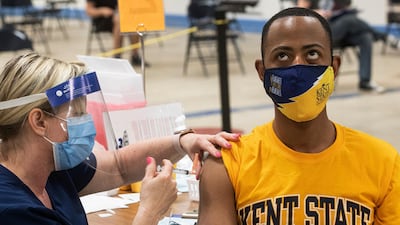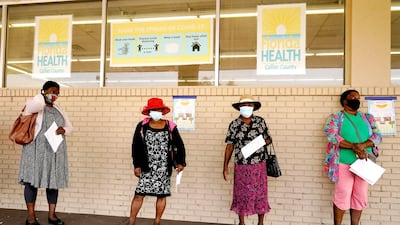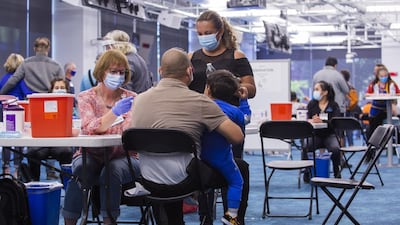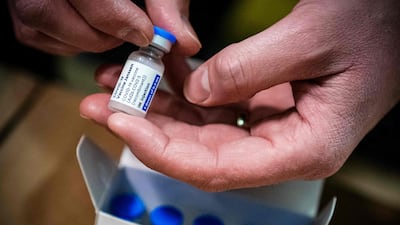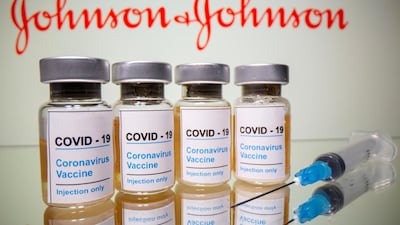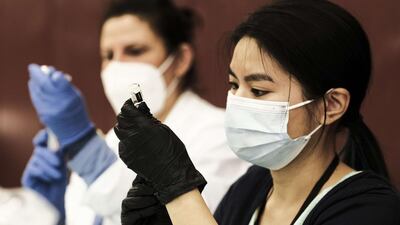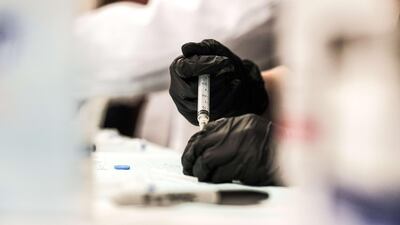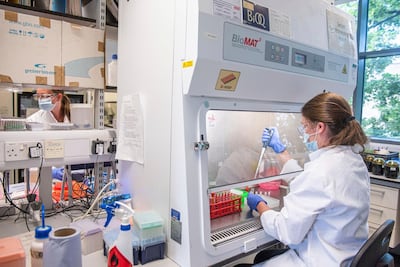The pausing of the Johnson & Johnson Covid-19 vaccine shots has shone further light on the side effects experienced by a very small number of vaccinated people.
As has been widely reported, six people – all women aged under 50 – among the 6.8 million given the Johnson & Johnson vaccine have suffered rare blood clots called cerebral venous sinus thrombosis (CVST).
In response, the US, European Union and South Africa have suspended the vaccine’s use while they investigate the side effects, which have caused one death and left another person in a critical condition.
It echoes problems with the Oxford-AstraZeneca vaccine, which has also been linked to very rare CVST cases.
Among 34 million doses in the European Economic Area, for example, 169 cases of CVST have been reported.
Both vaccines use non-replicating versions of a virus called an adenovirus to deliver genetic material into cells, so a similar mechanism could be behind their rare side effects.
What are the chances of a vaccine causing a blood clot?

So far the chances of the AstraZeneca vaccine causing a blood clot is about 1 in 250,000 in the UK, and the chances of the Johnson & Johnson vaccine causing a blood clot is about 1 in a million.
When you compare it with the risk of a blood clot after contracting the Covid-19 virus, these possibilities are minute.
In fact, this study found that blood clots can occur in about 1 in 5 Covid-19 sufferers.
How the vaccines could cause the rare blood clots?
The rare CVST cases are associated with low levels of platelets in the blood, these are tiny cell fragments found in large numbers and associated with clotting.
Also, the blood of people who have suffered the clots has been found to contain antibodies against a protein called platelet factor 4 (PF4).
Scientists think a process involving the antibodies and the platelets could cause clots to form in a small number of patients.
The fact that problems typically emerge one to two weeks after vaccination, according to experts, suggests that an immune response could indeed be at play.
Prof Paul Hunter, an infectious diseases specialist at the University of East Anglia in the UK, said it was similar to a side effect sometimes experienced by people who receive blood-thinning drugs called heparins.
The same antibodies are involved, he said.
“We have no idea why the adenoviral vector vaccine seems to trigger [these] antibodies,” said Prof Hunter.
“One [research] group has suggested the adenovirus itself may break up in the body and release DNA and that’s what’s triggering the immune response. It could be, but I don’t think there’s any good evidence.”
What have the companies and regulators said?

Johnson & Johnson said they have not found a clear link between the rare blood clots and the vaccine it produces, but it is working closely with regulators.
AstraZeneca said it was working to understand individual cases of blood clotting and the "possible mechanisms that could explain these extremely rare events".
The Centres for Disease Control and Prevention (CDC) has recommended pausing the use of single-dose Johnson & Johnson vaccine "out of an abundance of caution".
Britain's Medicines and Healthcare products Regulatory Agency has recommended that for those under 30, a different vaccine is administered.
Will researchers work out what is happening?
Prof Hunter said further research could more precisely uncover the mechanism by which the Oxford-AstraZeneca and Johnson & Johnson vaccines may cause rare blood clots.
“It’s quite likely that somebody at some point will work out that important step, because without that step, I don’t think we’re going to be able to modify the adenoviral vector vaccines,” he said.
Similar rare blood clots have not been seen with the Pfizer-BioNTech and Moderna vaccines, said Prof Hunter, even though they have both been used in large numbers in countries where vaccinations are heavily monitored.
These vaccines are based on messenger RNA (mRNA) genetic material.
“So we must assume on balance it’s something to do with the adenoviral vector,” he said.
Russia’s Sputnik V and Convidecia from China’s CanSino Biologics are also adenoviral vector vaccines, although there is no evidence they are linked to increased CVST risk.
While the Oxford-AstraZeneca vaccine is based on an adenovirus that infects chimpanzees, Sputnik V employs two adenoviruses that normally cause colds in humans, one of which is the same vector used in the Johnson & Johnson vaccine.
What happens with the adenoviral vector vaccines now?

Experts say side effects are extremely rare and, for most people, are vastly outweighed by the benefits of vaccination.
The UK government is relying heavily on the Oxford-AstraZeneca vaccine and is continuing to use it on everyone except under 30s.
Some other European countries have also suspended its use for people under a certain age, and certain Asian nations have imposed restrictions on the vaccine.
Dr Anthony Fauci, chief medical adviser to the US president, has said the US may not need the Oxford-AstraZeneca vaccine because it has enough doses of other vaccines, but the shot remains highly important in global campaigns, including in India, which also manufactures the vaccine.
Prof Hunter said if the US did not restart using the Johnson & Johnson vaccine, which is easy to administer because it issingle-dose, worldwide immunisation programmes could suffer.
“If the US decides not to fully authorise this vaccine, a lot of low-income countries will take the US stance,” he said.
“That’s going to be a big problem for global rollouts of immunisations.”
